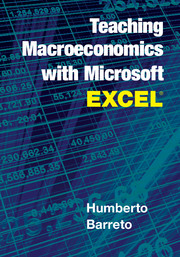Book contents
- Frontmatter
- Dedication
- Contents
- Preface
- Software Requirements and Opening a Macro-Enhanced Workbook
- Introduction:Why Simulation and Excel?
- 1 Charting in Excel
- 2 Economic Growth Literacy
- 2.1 Introduction
- 2.2 Setting the Scene
- 2.3 Attaining Economic Growth Literacy: MaddisonData.xls
- 2.4 Summary
- 3 The Solow Model
- 4 Macro Data with FRED in Excel
- 5 The Keynesian Model
- References
2.1 - Introduction
from 2 - Economic Growth Literacy
Published online by Cambridge University Press: 05 May 2016
- Frontmatter
- Dedication
- Contents
- Preface
- Software Requirements and Opening a Macro-Enhanced Workbook
- Introduction:Why Simulation and Excel?
- 1 Charting in Excel
- 2 Economic Growth Literacy
- 2.1 Introduction
- 2.2 Setting the Scene
- 2.3 Attaining Economic Growth Literacy: MaddisonData.xls
- 2.4 Summary
- 3 The Solow Model
- 4 Macro Data with FRED in Excel
- 5 The Keynesian Model
- References
Summary
In fact, the main purpose of my work was not to provide a dataset for econometric work, but to encourage a younger generation to scrutinise the basic source material, try to improve its quality where it is weak, and to illuminate the underlying causes of growth and backwardness. This is why I took a lot of trouble to describe the sources and methods transparently.
– Angus MaddisonLiteracy can mean more than the ability to read. To be literate in a particular subject is to know and master a body of material. “The authoritative definition of economic literacy is knowledge of the theories that are held by professional economists” (Stigler, 1983, 65). Literacy in the subfield of economic growth is the fundamental pedagogical goal of the MaddisonData.xls workbook. The competency achieved by working through this material provides a launching pad for models and explanations of economic growth.
It takes repeated practice to attain literacy in every subject, but economic growth literacy is especially challenging because in addition to the historical record and facts, it requires numeracy – the ability to work with numbers and the mastery of fundamental mathematical tools. Thus, the workbook can be neatly divided into two parts. The first covers basic mathematical ideas such as the Rule of 70 and the interpretation of a log scale. The second focuses on historical trends and country comparisons. Both are embedded in the data to make the work interesting and thought provoking.
Maddison's Data
The data are provided by the monumental work of Angus Maddison, who spent his career painstakingly compiling measures of productivity and output across time and space. The MaddisonData.xls workbook contains Maddison's original data, downloaded from http://www.ggdc.net/maddison, and adds buttons, scroll bars, and list boxes to make it easy to use and explore.
The Doc sheet contains complete documentation to download Maddison's original Excel workbook, horizontal-file_02–2010.xls, which contains the Population, GDP, and PerCapita GDP sheets. In addition to the obvious addition of buttons, scroll bars, and macros to the workbook, blank cells in these three data sheets were filled with #N/A.
Excel uses #N/A (not available) to signify that a value could not be found.
- Type
- Chapter
- Information
- Teaching Macroeconomics with Microsoft Excel® , pp. 31 - 34Publisher: Cambridge University PressPrint publication year: 2016

